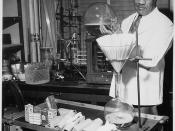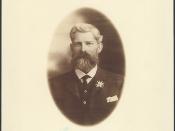Pharmacist
Pharmacists dispense drugs prescribed by physicians and other health practitioners and provide information to patients about medications and their use. They advise physicians and other health practitioners on the selection, dosages, interactions, and side effects of medications. Pharmacists must understand the use; clinical effects; and composition of drugs, including their chemical, biological, and physical properties. Compounding--the actual mixing of ingredients to form powders, tablets, capsules, ointments, and solutions--is only a small part of a pharmacist's practice, because pharmaceutical companies in a standard dosage and drug delivery form produce most medicines. Most pharmacists work in a community setting, such as a retail drug store, or in a hospital or clinic.
Pharmacists usually work in clean, well-lighted, and well-ventilated areas. Many pharmacists spend most of their workday on their feet. When working with sterile or potentially dangerous pharmaceutical products, pharmacists wear gloves and masks and work with other special protective equipment.
Many community and hospital pharmacies are open for extended hours or around the clock, so pharmacists may work evenings, nights, weekends, and holidays. Consultant pharmacists may travel to nursing homes or other facilities to monitor patient's drug therapy.
About 1 out of 7 pharmacists worked part time in 2000. Most full-time salaried pharmacists worked about 40 hours a week. Some, including many self-employed pharmacists, worked more than 50 hours a week.
Pharmacists held about 217,000 jobs in 2000. About 6 out of 10 worked in community pharmacies, either independently owned or part of a drug store chain, grocery store, department store, or mass merchandiser. Most community pharmacists were salaried employees, but some were self-employed owners. About 21 percent of salaried pharmacists worked in hospitals, and others worked in clinics, mail-order pharmacies, pharmaceutical wholesalers, home healthcare agencies, or the Federal Government.
A license to practice pharmacy is required in all States,


